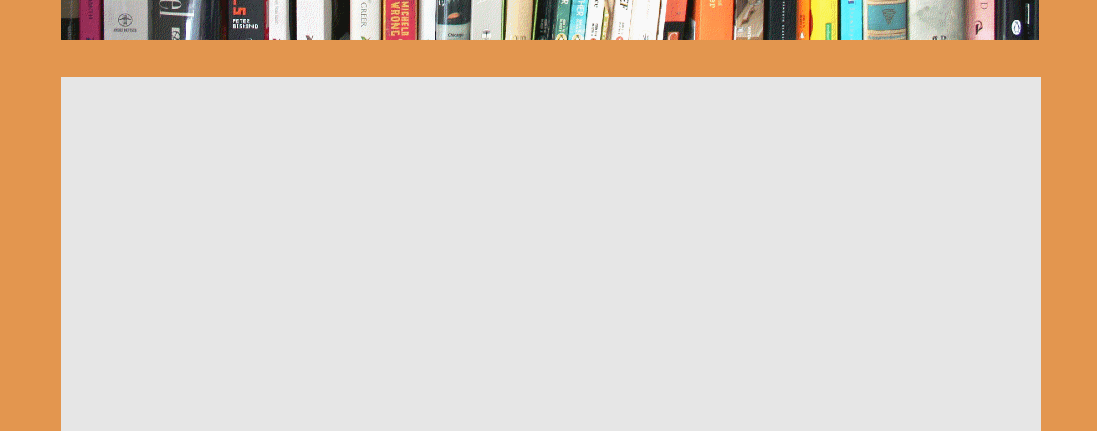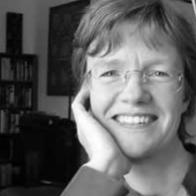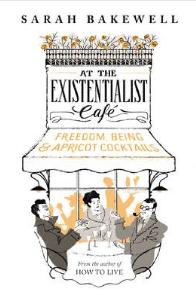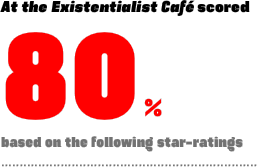 |
||||||||||||
 |
 |
|||||||||||
 |
 |
 |
 |
 |
 |
 |
||||||
 |
||||||||||||
 |
 |
 |
||||||||||
 |
||||||||||||





What was it about?
Sarah Bakewell, author of 'How To Live: A Life of Montaigne...' turns her attention to the Existentialist movement. She introduces us to key thinkers in a story spanning the 20th century. We furrowed brows over Husserl and Heidegger before moving on to the more convivial company of Jean-Paul Sartre and Simone de Beauvoir. We learned of Albert Camus, Maurice Merleau-Ponty ("the happy philosopher of things as they are") and Karl Jaspers. We looked at the ways these figures, through their thoughts and writing, influenced the generation to come.
What did we think of it?
At the heart of existentialism is the idea that human beings have freedom to choose, but that they must also accept responsibility for this freedom. We found this highly relevent to our current political situation. It's also a convivial philosophy drawn from an engagement with people and the world, and Bakewell's focus not on individuals but in relationships served her well. As she says 'ideas are interesting, but people are vastly more so.'
All agreed it was very well written and that Bakewell has an easy, engaging style that draws the reader through an often difficult subject. It seemed to us that what she attempted was ambitious – not just a history of one philosopher but a whole movement. By including generous amounts of background detail Bakewell contextualises things, and the ideas seem much clearer. It is an interesting way of looking at history, and one that Bakewell makes thought-provoking as well as entertaining.
In particular we were impressed by the way Bakewell tracks the fluidity of ideas – people don't always think the same thing; their relationships, the context of their lives, all this has an impact.
Minor criticisms were that while not a long book it does feel like a long read, requiring sustained attention. One person grumbled about the functional typesetting and plonking down of images with no regard to what would be visually pleasing, but was overruled by others who said it all worked perfectly well and actually was rather good and that the one person was applying far too niche a perspective on it (the one person wants printed books to be beautiful and not as hastily typeset as if they had been on a kindle, but recognises they are fighting a losing battle on this).
Would we recommend it?
A rewarding read that is a must for anyone who has ever wondered 'why am I myself?'
![]()
![]()
I really liked this, particularly the design and the look and feel of the book. I actually switched from the kindle to the print version. I found it quite emotional – the whole European project came out of the bloodbath of the Second World War and to think that we're turning our backs on that really upset me. I found it a fantastic book to read. It's such a good primer; I wish I'd been able to read it before I went to university.
![]()
![]()
Some of the chapters (Husserl, Heidegger) made my brain hurt but overall I really enjoyed this. I think Bakewell did a great job of taking complex philosophical ideas and rooting them in people and time and place while allowing us to see the universal truths. Camus was my hero. He was the guy I would like to have known.
![]()
![]()
Bakewell is a gloriously fluent, funny, warm writer. This seemed incredibly relevant to read right now as we face political upheaval and the overturning of sixty years of history. There was also a personal connection for me with my paternal grandmother who was passionate about French existentialism and my dad was really into Beat poets so it put me in touch with both those generations, their thoughts and aspirations.
![]()
![]()
I love the clarity with which Baker writes and the occasional dry asides that made me smile. I particularly loved the way she pulled out certain ideas such as Merleau-Ponty's notion of consciousness being like a 'fold' in the world that stays for a while before being smoothed away. And yet this book never engaged me very deeply and I fear I won't remember much of it a few weeks from now. Mainly I liked Simone de Beauvoir and I didn't feel there was enough about her. Reasons to go off and read more about her myself!

This book club took place in July 2016 at a time of political turmoil in the UK after the country voted to leave the European Union in a referendum. We managed to put our sadness and worry (and exasperation with Boris, Farage at al) aside for a couple of hours to drink apricot cocktails (recipe) and discuss philosophy at Laura's house. Our menu for the evening was an appropriately francophile pissaladière with salade niçoise, tasty cheeses and an apricot tart to finish.